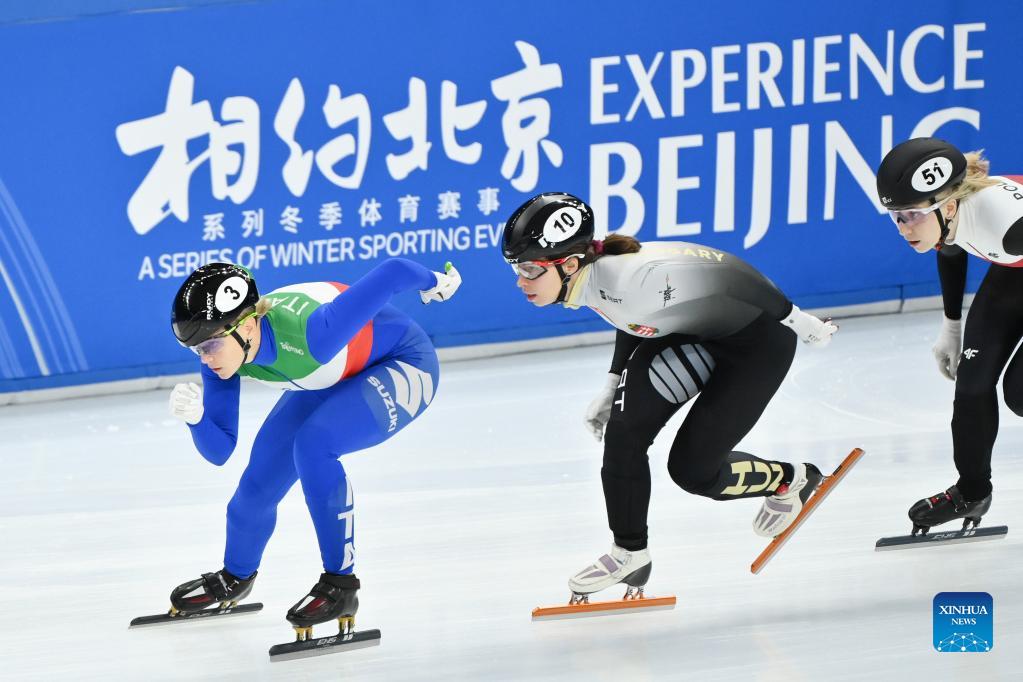Olympics organizers put emphasis on safety

Amid pandemic, bubble being set up for athletes, staff to ensure protection
With strict COVID-19 protocols to be deployed, Beijing and co-host Zhangjiakou in Hebei province have stepped up efforts to provide safe and pleasant experiences for all participants during the 2022 Winter Olympic Games.
Highlighted by a tight, closed-loop management system that has been operating on a trial basis during the ongoing Olympic test events, Chinese organizers' vigilance and emphasis on pandemic control and prevention leading up to the Games, which will open on Feb 4 in Beijing, have earned respect and acclaim from athletes and technical delegates alike with 99 days of preparations remaining.
The organizers, however, have refused to rest on their laurels, pledging to optimize services and operational details to not only guarantee the safety of the athletes and all others involved, but also to make sure their stay in China will be comfortable with a certain degree of freedom inside the bubble they are living in.
"The closed loop, which is key to our COVID-19 protocols, will be strictly implemented to separate all Games participants, whether they be international or domestic athletes and staff members, from the public to lower the risk of infection as much as possible," Zhang Jiandong, executive vice-president of the Beijing 2022 organizing committee and a vice-mayor of Beijing, said at a news conference on Wednesday.
"We will do our utmost, though, to provide as many services and amenities as possible at the accommodation facilities and Games venues to make sure that all participants will enjoy their stay."
As explained in the playbook, a guideline discussing pandemic control for the Games that was published on Monday, athletes and all participants will have to stay within a secured bubble that covers all venues across three hosting areas-Beijing's downtown, its northwest Yanqing district and Zhangjiakou's Chongli district. They are allowed to move freely within the bubble by using designated shuttle services and avoiding contact with local communities.
Daily reports of their body temperatures and health statuses via a smartphone app will be mandatory starting 14 days before they travel to China. Furthermore, Games participants who are not fully vaccinated will have to undergo 21 days of strict quarantine upon arrival.
Though they will be unable to visit landmarks and famous tourist attractions in the capital, organizers and venue operators have committed to offering participants the chance to view cultural performances, enjoy local cuisine and take part in recreational activities within the bubble to enrich their experiences here.
Pandemic-control rules will take effect during the Games, and the details of those rules have been discussed with the International Olympic Committee and relevant organizations, according to Zhang. Violators may face penalties, including disqualification from events for athletes.
Already put in place during this month's test events, COVID-19 protocols that will be in effect for the Games have convinced leaders of international governing bodies that the events will run safely and smoothly.
"We must make sure that we're in a safe environment… so far this has worked out very well. They've done an excellent job," said Kate Caithness, president of the World Curling Federation, who is overseeing a test event of the ice sport in Beijing.
"At the end of the day, our athletes have to focus on their performances. By feeling safe in the environment, they can then focus on the games."
The World Wheelchair Curling Championship, one of the test events, is taking place at Beijing's National Aquatics Center, the swimming venue for the 2008 Summer Olympics that has been transformed into an ice arena. Other test events will feature snowboarding, freestyle skiing and Nordic combined in co-host Zhangjiakou through the end of this year.
Already a popular ski destination before Beijing won the bid to host the Winter Games in 2015, Chongli district in Zhangjiakou has completed all four competition venues-three new projects and one existing resort-that will host the majority of snow-related events during the Games. The venues will produce 51 gold medals out of the 109 total next year.
COVID-19 countermeasures will also be evaluated thoroughly during the upcoming test events, while organizers, supported by local governments and health authorities, are busy preparing for the installation of mobile cabin labs with the ability to test up to 40,000 nucleic acid samples daily.
"The epidemic prevention and control measures for each venue and resort have been deployed and have gone through trials before the arrival of the international athletes to ensure proper handling of any emergencies during the Games," said Yan Pengcheng, a vice-governor of Hebei province.






